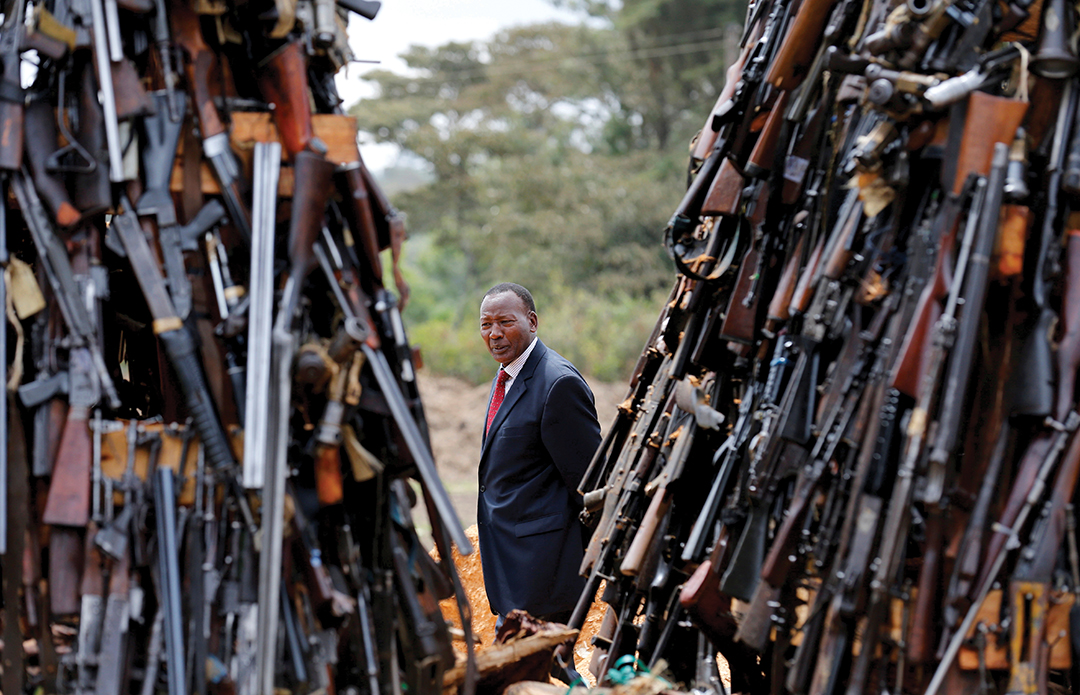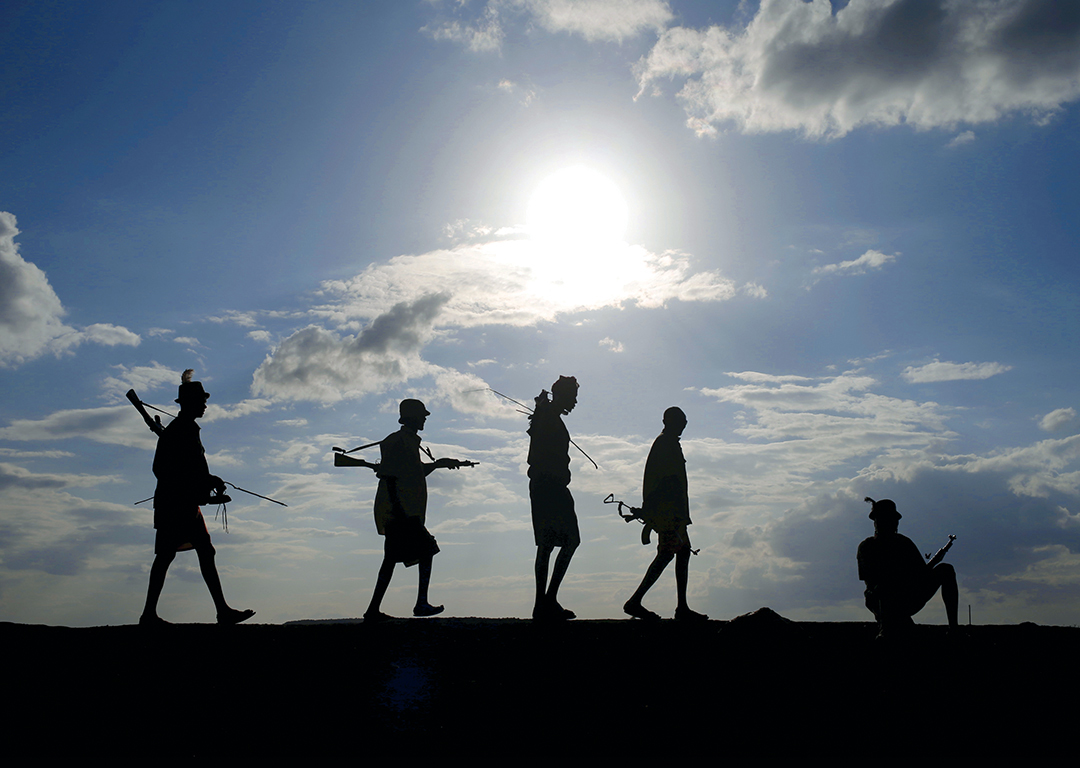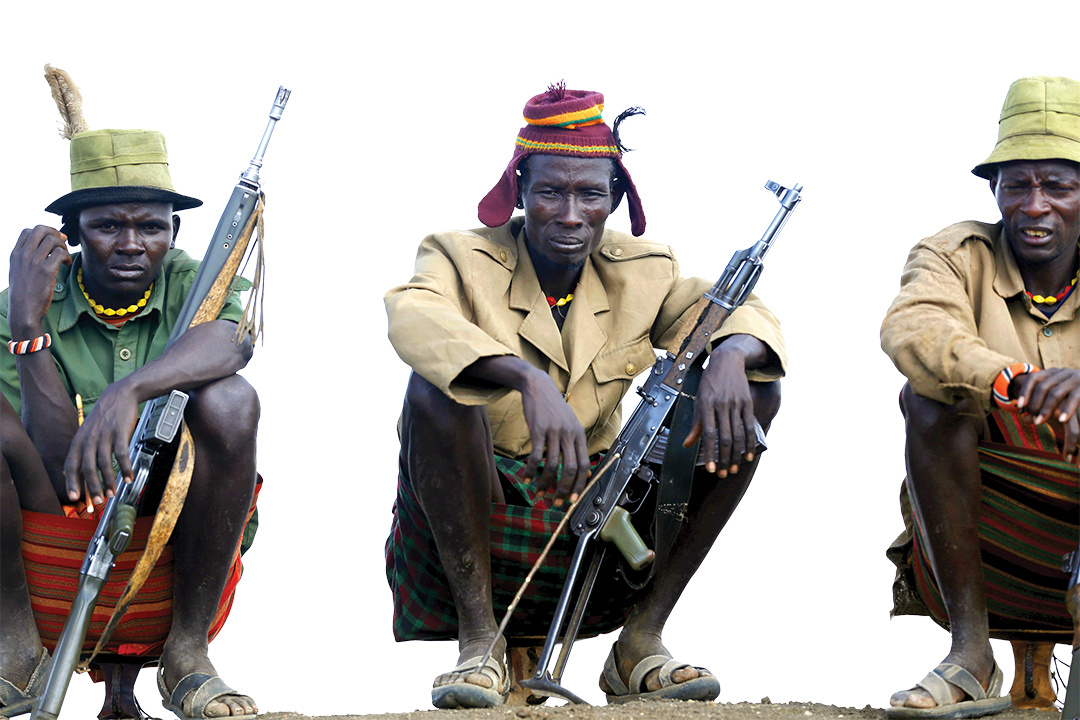Clashes in Kenya Reveal the Need to Control Illegal Weapons
ADF STAFF
Cattle rustling is not new to northwest Kenya. For generations, it has been a way of life in this rugged part of the world. Young men of the Turkana and Pokot tribes, who live side by side in the semiarid region, are taught that protecting livestock and, in some cases, taking it by force from their neighbors, is necessary to survive.
But in recent years this practice has grown deadlier. Firearms have replaced the traditional arrows and spears. Water, always scarce, has dried up. Herders have grown desperate.
The world got a glimpse of this violence in 2015. At dawn on May 4, hundreds of Turkana men raided the tiny village of Nadome, spraying its mud huts with bullets. Residents recalled that attackers formed a ring around their dwellings to prevent escape and fired wildly.
“I heard the first gunshot but before I could respond, the sounds of deafening firepower engulfed the entire manyatta as the raiders fired indiscriminately,” a 36-year-old man told The Standard. “I retreated a bit, and the bullet hit me on the left side of my head.”
In the end, the raiders made off with 3,000 goats, but the loot came at a terrible price. More than 60 people were killed. A journalist who visited the village described the overwhelming stench of death and the heartbreaking scene of a slain mother with her child, also dead, strapped to her back. “It’s a scene straight from hell,” reporter Vincent Mabatuk wrote.

In response to this and other massacres, the Kenyan government launched an initiative to confiscate illegal weapons in four northwest counties. Illegal firearms abound in the country. On the outskirts of Nairobi, an illegal pistol sells for $80 or less. Weapons such as AK-47s sell for $140. Pastoralists regularly trade cattle for weapons, researcher Mbugua Njoroge found, and there is a steady supply of guns streaming in from conflict areas in nearby Somalia, South Sudan and Uganda.
A 2016 National Security Report submitted to Kenya’s Parliament estimated that between 580,000 and 650,000 illicit arms are circulating in the country, posing “significant socio-economic, political and security risks.” The authors also conceded that disarmament initiatives by the government “have not yielded the desired results.”
So, what can be done? The answer lies in Kenya’s own National Policy on Small Arms and Light Weapons and other best practices that have been adopted across the continent. Many of these best practices are laid out in the Nairobi Protocol for the Prevention, Control and Reduction of Small Arms and Light Weapons, signed by 11 African countries in 2004. The United Nations also outlines proven strategies for arms control in its program of action to halt illegal weapons traffic. These documents are the framework for a plan to stop the flow of illegal weapons. This generally includes marking and tracing legal weapons, regulating weapons brokers, securing government stockpiles, strengthening border security, and shutting down the artisanal blacksmiths who make new guns or illegally retrofit old ones.
Securing Stockpiles
Across Africa, an alarming number of guns acquired by criminals and extremists are diverted from official stockpiles. In 2014, for example, the Nigerian Army revealed that the terror group Boko Haram looted armories and used the military’s own weapons against its Soldiers.
Best practices state that stockpiles should be kept locked behind vault doors and under surveillance. Keys should be given only to law enforcement officers who need access, and officers should make spot checks regularly. Weapons logs should be electronic with regular audits to spot irregularities. Surplus weapons should be disposed of, and, as a further precaution, stockpiles should be stored away from populated areas to minimize loss of life in an explosion.
Afua Lamptey, who has taught security professionals about arms management at the Kofi Annan International Peacekeeping Training Centre in Ghana, wrote that the continent needs to offer more training in stockpile management. She noted that properly training an ammunition technician takes six to 10 years, and most people who oversee stockpiles lack that training. “There exists a huge gap in staff training in the subregion,” she wrote. “Training opportunities for practitioners are relatively few, and most personnel have to rely on their own resourcefulness and experience to respond to the challenges encountered on the job.”

Many nations are requiring that weapons get unique markings at the time of manufacture or import. The marking should list the name of manufacturer, the country or place of manufacture, and the serial number. If imported, an end-user certificate is required.
For tracing gun ownership, it is considered best practice to start a national database, including a recent photograph of the owner, his or her name, address and date of birth, the make and model of the firearm, and other relevant markings. The database also should include weapons license details, including renewals, suspensions and copies of the original license application.
In 2014, the Ghana National Commission on Small Arms and Light Weapons started marking all state-owned weapons using an embossment of unique identification numbers. The commission hopes to follow this up with a nationwide database. Before the project, Ghana determined that more than half of the weapons in circulation were illegal. In 2016, Ghana held a weapons amnesty program to let gun owners register illegally held weapons without penalty.
“Comprehensive marking of weapons, combined with analysis, will enable law enforcement agencies and other relevant authorities to identify and monitor trends and patterns of supply and use of illicit arms,” said Jones Applerh, executive secretary of Ghana’s Small Arms Commission.
Brokers
Kenya is one of many African countries that has called for more regulation and licensing of weapons brokers. The Nairobi Protocol outlines that states should maintain a database of all weapons brokers, including passport and company information. Registered brokers must obtain authorization for any weapons transfer. States should never authorize a transfer domestically or internationally if weapons are likely to be used in violent crimes, violations of humanitarian law or against regional stability.
Recent history shows that many illegal weapons can be traced to a small number of unscrupulous brokers with international ties. In January 2017, an importer at the Apapa Port in Lagos, Nigeria, was found to be transporting 661 illegal pump-action shotguns concealed inside steel doors. Authorities arrested three men and traced the shipment to China and Turkey.
After the seizure, Nigeria’s comptroller general of customs, Ahmed Ali, called for a crackdown on illegal weapons brokers and asked for the public’s assistance in identifying illegal shipments. “We must now put all our hands on deck,” he told Nigeria’s The Guardian. “The security problem of this country must be addressed by all of us, and we must contribute our quota by ensuring that we give the right information. If we see an issue, an item or suspicious movement, we should let the authorities know. That is the only way we would be able to ensure we do our job. Without information, there is no way we can curb this menace.”
Cooperation
Weapons traffickers tend to exploit weakness, wherever it exists. This weakness could be a failed state in which warring parties buy arms in bulk, or it could be a porous border where arms can be shipped undetected. Africa’s security leaders have identified the need to share resources to shore up weak points.
In its national arms policy, Kenya calls for cooperation with its neighbors, sharing information relating to arms movements, and developing legal uniformity in the region so traffickers can be prosecuted wherever they are caught. Progress can be seen in the Eastern Africa Police Chiefs Cooperation Organization, which develops common strategies for shared threats in East Africa and quickly disseminates information on transnational crime. The group and its partner organization in Southern Africa have held joint operations to clamp down on trafficking. They are backed by Interpol, the international policing organization.
At a 2016 meeting of regional Interpol heads in Kigali, Rwandan Assistant Commissioner of Police Tony Kulamba said partnerships and intelligence sharing are the way of the future on the continent. “Deepening cooperation and quick response to each other’s requests is the only message to criminals that there is no hiding place for them anywhere,” Kulamba said.
Demand Factors
Research shows that demand for weapons increases when citizens lack security. This is particularly true when they feel the state cannot or will not protect them. In places like northwest Kenya, it is vital to address insecurity and the underlying causes of weapons demand.
Pastoralists believe “national law is not adequately enforced by Kenyan police in their marginalized regions,” Njoroge wrote. “The only option they have is to arm themselves for personal, communal, clan or larger family defence requirements. They do this as a defensive measure against bandits and other clans as well as to advance their own interests.”
Governments, Njoroge said, cannot simply collect illegal weapons in insecure places and assume peace will follow. In regions such as rural Kenya, pilot projects stressing traditional dispute resolution, peacebuilding and development initiatives that give all groups a shared purpose are needed to give people the confidence to choose development over weapons.
One such initiative was the “peace caravan” launched soon after the Nadome massacre. In it, 15 regional politicians and elders from pastoralist communities traveled around three affected counties to discuss strategies to end the killings. The caravan recommended the creation of a ministry to oversee pastoral areas and investment to build a lasting peace. “Cattle rustling has enormously contributed to poverty and has left more orphans and widows,” said Gov. Benjamin Cheboi of Kenya’s Baringo County. “The region must be free from gunfire. Those who have been buying guns and bullets must now channel the money to education and business.”


Comments are closed.